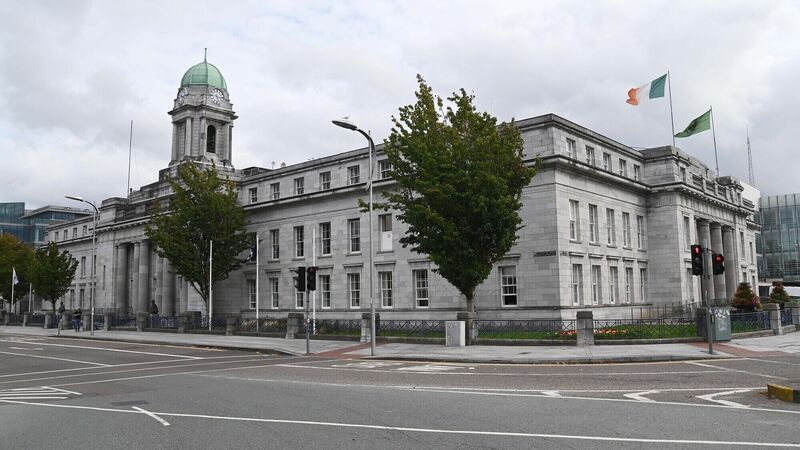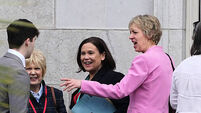Analysis shows which elected reps tabled the most motions at full Cork City Council meetings

There is just one meeting left in this current council term, and an analysis of the agendas of the council meetings so far suggests a very different outlook between parties on the tabling of motions. Picture: Denis Minihane.
At Monday’s council meeting, the full agenda was heard for the first time since January, including multiple motions which have been deferred for months.
Councillors agreed at 8pm, when the meeting was supposed to end, to stay an extra hour and try to clear the backlog, which they succeeded in doing.
This came after an ongoing debate about the length of the meetings and whether councillors should finish at the scheduled time or stay until the full agenda is heard, as well as the validity of motions addressing national and international issues, where councillors will often vote on writing a letter to a relevant government minister or State body to highlight a problem affecting their constituents.
There is just one meeting left in this current council term, and an analysis of the agendas of the council meetings so far suggests a very different outlook between parties on the tabling of motions.
The Progressive Alliance, made up of Labour, the Greens, and the Social Democrats, have had 116 motions discussed in a full council meeting.
This is followed by 30 Sinn Féin motions, 26 from the Independents and Others grouping, 22 from Fine Gael, and nine from Fianna Fáil.
When councillors propose motions, they often go first to meetings for individual wards or to strategic policy committees (SPC), and if resolved at that level, are not heard by the full council.
Fianna Fáil’s Colm Kelleher, who was one of six councillors in his party who did not have any motions debated during full council meetings since last summer, explained that the motions he tables are “bread and butter stuff”.
“I submit motions on local government issues – traffic calming measures, street lighting, footpath repairs – all of those go to the local area committee and from there can be sent to special policy groups,” Mr Kelleher told The Echo.
“Motions I have put in recently include road resurfacing in Bishopstown, getting a lollipop person outside the Gaelscoil — my motions may be fairly boring from a news perspective, but they’re what local government is all about,” he added.
“All the motions that end up on the council meeting agenda, some of them come from the relevant SPCs but then there’s non-statutory motions at the end of the meeting, and the executive get up and walk out at that stage — once it gets to that point, we’re only talking to ourselves.
“Motions like licencing for quadricycle drivers, it’s a valid motion and I agree 100% on it, but it’s for national government, or topical things like reopening the old Cork Prison, banning Israel from the Eurovision — we’ve no say in those,” Mr Kelleher said.
“I’m not in the business of putting in motions that are grabbing headlines, mine are dealt with at a local level because they’re things I directly have say over as a member of the local government.
“Ninety per cent of the people that come to me do so to fix their footpaths, fix their roads, because of a problem with planning — that’s what we’re elected to do and the majority of my party colleagues feel the same.”
“I have had motions that do go to full council if I can’t get it resolved locally, but nine times out of 10, I can.”
Overall, in this council term from July to May, Labour’s Peter Horgan and the Green’s Oliver Moran have had the most motions heard, with 29 and 27 respectively.
Labour councillors have had 62 motions heard in total, with 20 from Laura Harmon who was elected to the Seanad at the end of January, and two from Ciara O’Connor who replaced her, as well as 11 from John Maher.
The Green Party have had 46 motions, 16 from Honore Kamegni and three from current Lord Mayor of Cork Dan Boyle, while the Social Democrats, between Pádraig Rice, who was elected to the Dáil in November and Niamh O’Connor who replaced him, have had eight motions heard.
Sinn Féin have had 30, 10 from both Michelle Gould and Kenneth Collins, seven from Joe Lynch and three from Fiona Kerins.
People Before Profit-Solidarity’s sole councillor Brian McCarthy has had nine, and the Workers' Party’s Ted Tynan has had two.
Independent Ireland’s Ken O’Flynn, who became a TD in 2024 and Noel O’Flynn who replaced him have had three motions, as has Independent Kieran McCarthy, while Independent’s Albert Deasy and Paudie Dineen have had five and four respectively.
Fine Gael has had 22 motions heard, nine from Shane O’Callaghan, seven from Joe Kavanagh, and three each from Damian Boylan and Des Cahill, while there were no motions from Garrett Kelleher, who served until February 2025, or Gary O’Brien, who was co-opted to replace him.
Fianna Fáil had nine motions heard — five from Seán Martin, two from John Sheehan and two from Tony Fitzgerald.
Fianna Fáil councillors Terry Shannon, Fergal Dennehy, Colm Kelleher, Terry Coleman, Margaret McDonnell, and Mary Rose Desmond had no motions heard from July 2024 to May 2025.
Speaking to The Echo, Labour’s Peter Horgan said he was elected to raise issues that are of concern to his ward, the city and wider societal issues also “and I make no apology in doing so”.
“While motions are one way of raising issues of policy or concern there are numerous service requests that I am working on with the executive and cross party with other councilors.
“I’ll continue in that fashion for as long as I have a mandate to do so, working closely with my Labour Party colleagues John Maher and Ciara O’Connor.”
Speaking to The Echo Green Party councillor Oliver Moran said: “It’s a huge privilege to represent the people of this city and someone never knows when it might come again. So it wouldn’t feel right to me not to use that opportunity to its most while I can.
“It’s not surprising that myself and Peter have a similar number of motions in our names. We both come from that outlook.
“We’re not there to make up numbers.
“This month I’ve motions on housing policy, community parks, the development plan, fire safety. For those of us who are there to shift the dial, motions are a major plank of how we do that. That’s where policy changes get formally initiated, as well as engaging with officials on the day-to-day.”










 App?
App?





